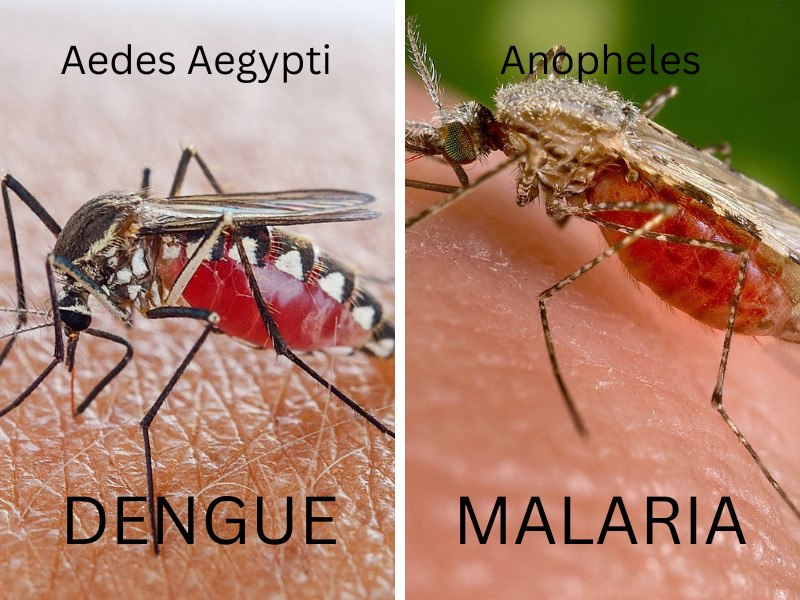Mosquitoes in Thailand: What Tourists Need to Know About Staying Bite-Free
Ah, Thailand – a land of endless beauty, captivating culture, and thrilling adventures that draws countless travelers from all corners of the globe. With its mesmerizing beaches, lush jungles, and bustling cities, there’s no shortage of excitement to be had.
But hold up! Before you pack your bags and set off on your epic journey, there’s one tiny detail that you should be aware of: mosquitoes.
Thinking about mosquitoes might not be high on your Thailand to-do list, but trust me, these little guys can pack a punch.
These miniature, buzzing nuisances are more than just annoying; they can also carry but they can also carry nastier surprises like dengue fever, malaria, chikungunya, and Zika. Thankfully, the chances of actually getting any of these is very low.
In this guide, you’ll learn everything you need to know about avoiding mosquito bites, staying healthy, and enjoying your trip worry-free. Equipping you with knowledge and practical advice to ensure your trip is as safe and enjoyable as possible.
Mosquitoes in Thailand: An Overview
When is mosquito season?
Thailand is warm and humid year-round, but mosquito activity spikes during the rainy season, roughly May to October. Standing water from heavy rains creates perfect breeding grounds. That said, you’ll find mosquitoes buzzing around any time of year, especially at dawn and dusk.
Are mosquito species in Thailand dangerous?
When it comes to mosquitoes, Thailand is home to a diverse range of species, but not all of them pose a threat to humans. The primary culprits that you’ll want to watch out for are the Aedes aegypti and Anopheles mosquitoes.
Aedes aegypti, also known as the yellow fever mosquito, is easily recognized by its distinctive black and white markings – see the photo below. This species is a daytime biter, with peak activity during early morning and late afternoon. This is the type of mosquito that spreads Dengue fever here in Thailand.
On the other hand, the Anopheles mosquito, a primary carrier of malaria, is more active at night. Being familiar with these mosquitoes can help you identify potential threats and take appropriate precautions.

Mosquito-borne diseases prevalent in the country
While the buzzing and itching of mosquito bites can be annoying, it’s the diseases they can carry that pose the most significant concern for travelers. Here are some of the most common mosquito-borne diseases in Thailand:
Dengue fever
Let’s start with the most common and widespread. Dengue fever is a viral infection transmitted by the Aedes mosquito. Although it’s more common in rural areas, cases have been reported in urban environments as well. Symptoms can range from mild flu-like signs to severe complications like dengue hemorrhagic fever. Keep in mind that there’s no specific treatment or vaccine for dengue fever, so prevention is key.
Malaria
Malaria is caused by a parasite transmitted through the bite of an infected Anopheles mosquito. While the risk of malaria is generally low in major tourist destinations, remote and forested areas can pose a higher risk, especially during the rainy season. Antimalarial medication can help protect against infection, so consult with a healthcare professional before your trip.
Zika virus
The Zika virus, another disease transmitted by the Aedes mosquito, has been reported in Thailand. While the symptoms are usually mild and short-lived, it can be dangerous for pregnant women, as the virus has been linked to birth defects. Couples planning a pregnancy should be cautious and consult with a healthcare professional for guidance.
Chikungunya
Chikungunya is a viral disease transmitted by the Aedes mosquito, with symptoms similar to dengue fever, including joint pain and fever. Though rarely fatal, the joint pain can be severe and debilitating. As with dengue, there is no specific treatment or vaccine available.
Japanese encephalitis
Japanese encephalitis is a rare but potentially severe disease transmitted by the Culex mosquito. It is more common in rural areas where pigs and wading birds are present. A vaccine is available, and travelers spending an extended time in rural areas or planning outdoor activities should consider getting vaccinated.
Before you freak out and think ‘Shit, there’s killer mozzies everywhere!!!‘ it’s worth bearing in mind that 99% of people visit Thailand and survive any mosquito bites with nothing worse than some annoying, itchy red spots. Statistically, the chances of catching any of the above diseases is minimal. But if you are going to worry about catching one, then Dengue is by far the most prevalent.
Now that we’ve covered the basics of mosquitoes in Thailand and the diseases they can transmit, let’s move on to tips and strategies for keeping yourself protected during your trip.
Where in Thailand Is Malaria a Risk?
If you’re sticking to cities, beaches, and tourist islands, you’re safe. But if you’re trekking through remote jungles or staying in rural villages near the borders of Myanmar, Cambodia, or Laos, malaria prevention measures are smart.
Risks and Impacts of Mosquito Bites
Potential health complications
While many mosquito bites result in nothing more than an itchy bump, some can lead to serious health complications. As we mentioned earlier, diseases like dengue fever, malaria, Zika virus, chikungunya, and Japanese encephalitis can cause a range of symptoms, from mild to severe. In some cases, these diseases can lead to hospitalization or even be life-threatening.
Being aware of the risks and taking preventive measures can help ensure that your trip remains a positive experience.
How mosquito-borne diseases can affect travel plans
No one wants to fall ill during their vacation, and mosquito-borne diseases can put a damper on your travel plans. Besides the discomfort and potential health risks, being sick can lead to costly medical bills and missed activities. In some cases, you may even need to cut your trip short or delay your return home.
By taking appropriate precautions to avoid mosquito bites, you can minimize the chances of your trip being derailed by these pesky insects.
High-risk areas and seasons for mosquito exposure
While mosquitoes can be found throughout Thailand, certain areas and times of the year pose a higher risk for exposure. Rural, forested regions and areas near standing water are prime mosquito breeding grounds, so be extra cautious when exploring off the beaten path. Additionally, the rainy season (typically May to October) sees an increase in mosquito populations due to the abundance of water, making it the ideal time for these insects to breed. If you’re planning a trip during this period, be prepared to take extra preventive measures to protect yourself from mosquito bites.

Prevention: Staying Protected from Mosquito Bites
Choosing appropriate clothing
One of the simplest ways to protect yourself from mozzie bites is by dressing smartly. Here are some clothing tips to keep in mind:
Long sleeves and pants
Wearing long-sleeved shirts and pants can provide a physical barrier between your skin and mosquitoes. This helps minimize the chances of getting bitten, especially during peak mosquito activity hours.
Light-colored fabrics
Mosquitoes are more attracted to dark colors, so wearing light-colored clothing can make you less noticeable to these pests. Plus, lighter shades help keep you cool in Thailand’s tropical climate.
Loose-fitting garments
Loose clothing makes it more difficult for mosquitoes to bite through the fabric and reach your skin. Opt for garments that are comfortable and provide ample coverage without being too tight.
Using insect repellents
Insect repellents are an essential tool in your mosquito-fighting arsenal. Here are some pointers on choosing and using repellents:
DEET-based repellents
DEET is a highly effective ingredient found in many insect repellents. Choose a product with a concentration of 20-50% DEET for optimal protection against mosquitoes. Remember to follow the instructions on the label and reapply as needed.
Natural alternatives
If you prefer a more natural option, consider repellents containing oil of lemon eucalyptus, picaridin, or IR3535. These ingredients have been shown to provide protection against mosquitoes, although they may need to be reapplied more frequently than DEET-based products.
Application tips
Apply insect repellent to exposed skin, avoiding the eyes, mouth, and any open cuts or wounds. Don’t forget to apply it on your ankles and feet, as mosquitoes often target these areas. When using sunscreen, apply it first and let it dry before applying repellent.
Best Mosquito Repellents to Buy in Thailand
You don’t need to haul a suitcase full of sprays from home. In Thailand, you’ll find excellent, affordable mosquito repellents like:
-
Soffell: Sweet-smelling, lightweight lotion popular with locals.
-
OFF! Deep Woods: Stronger DEET formula for heavy-duty protection.
-
MosquiGuard: DEET-free option with Picaridin.
Sleeping arrangements
Ensuring a good night’s sleep without pesky mosquito interruptions is crucial. Here are some tips for keeping mosquitoes at bay while you rest:
Mosquito nets
If you’re staying in a place without screens on windows and doors, consider using a mosquito net treated with insecticide. These nets provide an effective physical barrier to keep mosquitoes out while you sleep.
Air-conditioned rooms
Mosquitoes are less active in cooler temperatures, so choosing accommodations with air conditioning can help reduce your exposure to these pests.
Insect screens on windows and doors
When booking accommodations, look for places with insect screens on windows and doors. This can help keep mosquitoes outside while allowing you to enjoy the fresh air.
What to Do if You Get Sick after a Mosquito Bite
Despite our best efforts, mosquito bites can still happen. Here’s what to do if you find yourself on the receiving end of a mosquito’s attention. But if you experience sudden high fever, rash, severe headaches, or muscle pain after being bitten, please go to a doctor immediately. Dengue fever often feels worse than a normal virus and should be treated seriously.
First-aid tips for mosquito bites
Clean the area: Wash the bite with soap and water to reduce the risk of infection.
Apply an anti-itch cream: Over-the-counter hydrocortisone cream or calamine lotion can help relieve itching and swelling. You can also use a cold compress to soothe the area.
Avoid scratching: Scratching a mosquito bite can break the skin, increasing the risk of infection and prolonging the healing process. Try to resist the urge, even if it’s driving you crazy!
Identifying symptoms of mosquito-borne diseases
Being able to recognize the symptoms of mosquito-borne diseases can help you seek medical attention promptly if needed. Common symptoms include fever, headache, joint pain, rash, and muscle aches.
Keep in mind that symptoms may vary depending on the specific disease and can range from mild to severe.
Seeking medical attention
If you suspect that you’ve contracted a mosquito-borne disease, it’s important to seek medical help as soon as possible. Early diagnosis and treatment can help prevent complications and ensure a faster recovery. Make sure to inform the healthcare professional of your recent travel history and any potential mosquito exposure.
Travel insurance considerations
Before embarking on your trip to Thailand, consider purchasing comprehensive travel insurance that covers medical expenses, trip cancellations, and other potential issues. In the event that you contract a mozzie-borne disease, travel insurance can help offset medical costs and cover any changes to your travel plans.
By knowing what to do if you get bitten and being prepared to handle the situation, you can minimize the impact of mosquito bites on your trip and focus on enjoying your time in Thailand.
Responsible Tourism: Minimizing Your Impact on the Environment
While protecting yourself from mosquito bites is important, it’s also crucial to consider the environmental impact of your actions. Here are some tips for practicing responsible tourism while keeping mosquitoes at bay:
Eco-friendly mosquito control methods
Avoid using harmful chemicals: While some chemical insecticides can be effective at killing mosquitoes, they can also harm the environment and other wildlife. Opt for eco-friendly repellents and mosquito control methods whenever possible.
Remove standing water: Mosquitoes breed in standing water, so be mindful of any containers or objects that may collect water around your accommodations. Emptying these sources can help reduce mosquito populations and protect local ecosystems.
Follow community guidelines: In some areas, local authorities may implement mosquito control measures, such as fogging or insecticide spraying. Be respectful of these practices and follow any guidelines provided by the community.
Learn from locals: Local residents often have valuable knowledge about how to deal with mosquitoes in their environment. Take the time to ask for advice and learn from their experiences.
By practicing responsible tourism and considering the environmental impact of your actions, you can help preserve Thailand’s natural beauty and ensure a memorable, mosquito-free trip for yourself and future travelers.
+++
So there you have it. You now know more than the majority of visitors about the potential dangers of mosquitoes in Thailand, shedding light on the different species you might come across and the illnesses they can spread. And, hopefully you’ve discovered how to dodge mozzies and stay safe throughout your journey.
Remember, it’s all about dressing wisely, arming yourself with the right repellents, and being mindful of your surroundings when it comes to accommodations and activities. By doing so, you’ll be well on your way to minimizing any mosquito-related risks and potential health issues.
Plus, let’s not forget the importance of being a responsible traveler. Your choices and actions can make a real difference in preserving Thailand’s awe-inspiring natural beauty. So go forth, explore, and embrace the unforgettable experiences that await you here on Koh Chang or elsewhere in the Land of Smiles – and show those mosquitoes who’s boss :-)
Happy adventuring!




